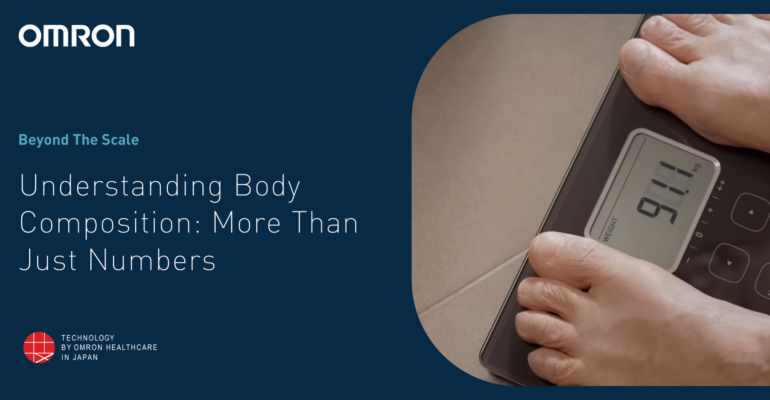Understanding Body Composition: More Than Just Numbers
October 5, 2023 2024-02-15 14:34Understanding Body Composition: More Than Just Numbers

Understanding Body Composition: More Than Just Numbers
Body composition is a term that is frequently used in the fitness and health industry. But what exactly does it mean, and why is it so important? Many people identify body composition with numbers on a scale, but it’s far more complex than that.
In this blog post, we will delve deep into the concept of body composition, exploring what it is, why it matters, and how you can achieve a healthy body composition beyond the mere digits.
Defining Body Composition
Body composition refers to the proportion of fat and non-fat mass in your body. Non-fat mass includes bone, muscle, and fluids. Unlike the traditional focus on weight and BMI (Body Mass Index), understanding body composition provides a more accurate picture of your physical health. Two individuals with the same weight and height might have vastly different body compositions, which means their overall health and fitness levels differ significantly.
Why Body Composition Matters
- Health Indicator: Body composition is a crucial indicator of your overall health. Excessive body fat, especially around vital organs, can increase the risk of various health issues, including heart disease, diabetes, and certain cancers. On the other hand, having an adequate amount of muscle mass can enhance your metabolism and support overall body functions.
- Performance: For athletes and fitness enthusiasts, understanding body composition is essential for optimizing performance. Muscle mass, in particular, plays a pivotal role in athletic abilities. Athletes often focus on building lean muscle mass and reducing body fat to improve their strength, speed, and endurance.
- Aesthetics: Let’s be honest; many people have aesthetic goals when it comes to their bodies. Body composition plays a significant role in how your body looks. Reducing body fat and building muscle can lead to a toned and sculpted physique.
- Longevity: Maintaining a healthy body composition can contribute to a longer, healthier life. By managing body fat levels and promoting muscle mass, you’re reducing the risk of obesity-related diseases and improving your overall quality of life as you age.
Beyond the Numbers
While numbers are essential in tracking changes in your body composition, it’s equally important to consider how you feel and function. Here are some qualitative aspects to focus on:
- Energy Levels: Pay attention to your energy levels throughout the day. A balanced body composition often leads to sustained energy levels, making you feel more vibrant and active.
- Mental Well-being: Regular physical activity and a balanced diet not only impact your body but also your mind. Exercise releases endorphins, which can enhance your mood and reduce stress and anxiety.
- Physical Abilities: Take note of how your physical capabilities improve. Improvements in body composition can help your regular tasks, such as carrying groceries without exertion or climbing stairs without feeling out of breath.
- Confidence: Achieving a healthy body composition can significantly boost your confidence and self-esteem. Feeling good in your own skin positively affects various aspects of your life, including relationships and work.
Achieving a Healthy Body Composition
Achieving and maintaining a healthy body composition involves a combination of regular exercise, balanced nutrition, and lifestyle choices. Here are some tips to help you on your journey:
- Strength Training: Incorporate strength training exercises into your fitness routine. Lifting weights or doing bodyweight exercises can help build lean muscle mass, boosting your metabolism and improving your body composition.
- Cardiovascular Exercise: Include cardiovascular exercises like running, swimming, or cycling to burn calories and improve your cardiovascular health. Cardio workouts, combined with a balanced diet, can help reduce body fat.
- Nutrition: Focus on a balanced diet that includes a variety of whole foods. Prioritize lean proteins, fruits, vegetables, whole grains, and healthy fats. Avoid excessive consumption of processed foods, sugary beverages, and unhealthy fats.
- Hydration: Stay properly hydrated, as water is essential for various bodily functions, including metabolism and digestion. Feelings of hunger are sometimes symptoms of dehydration, so drink plenty of water throughout the day.
- Rest and Recovery: Adequate sleep and proper recovery are often overlooked but crucial factors in achieving a healthy body composition. Your body needs time to repair and grow stronger after exercise, so ensure you get enough rest.
- Consistency: A healthy body composition is not produced in a day, just as Rome was not built in a day. Be consistent with your efforts, stay patient, and celebrate your progress, no matter how small it might seem.
The Omron Body Composition Monitor is designed to measure various components of your body, providing more than just a number on a scale. It assesses metrics such as body fat percentage, muscle mass, and more. This comprehensive tool helps individuals better understand their body composition, enabling them to make informed decisions about their health and fitness goals.
Conclusion
Understanding body composition is indeed more than just numbers on a scale. It’s about how you feel, how your body functions, and how you perceive yourself. Embrace the journey, celebrate your achievements, and remember that a healthy body composition is a reflection of a healthy, happy you.
Reference:
- https://www.healthline.com/nutrition/improve-body-composition
- https://www.webmd.com/fitness-exercise/what-is-body-composition
- https://www.healthline.com/health/fitness-exercise/body-composition-exercises#The-essential-exercises






